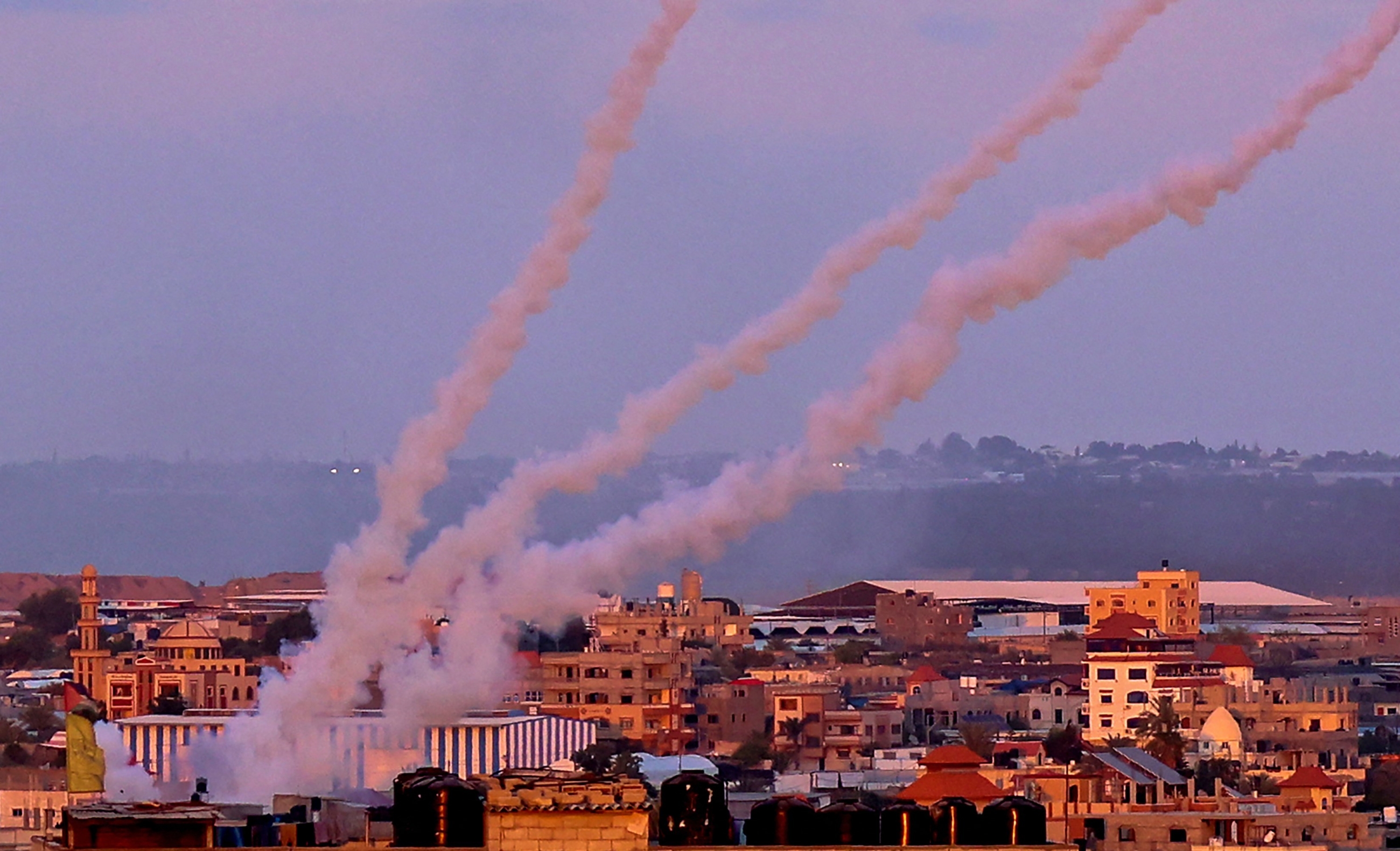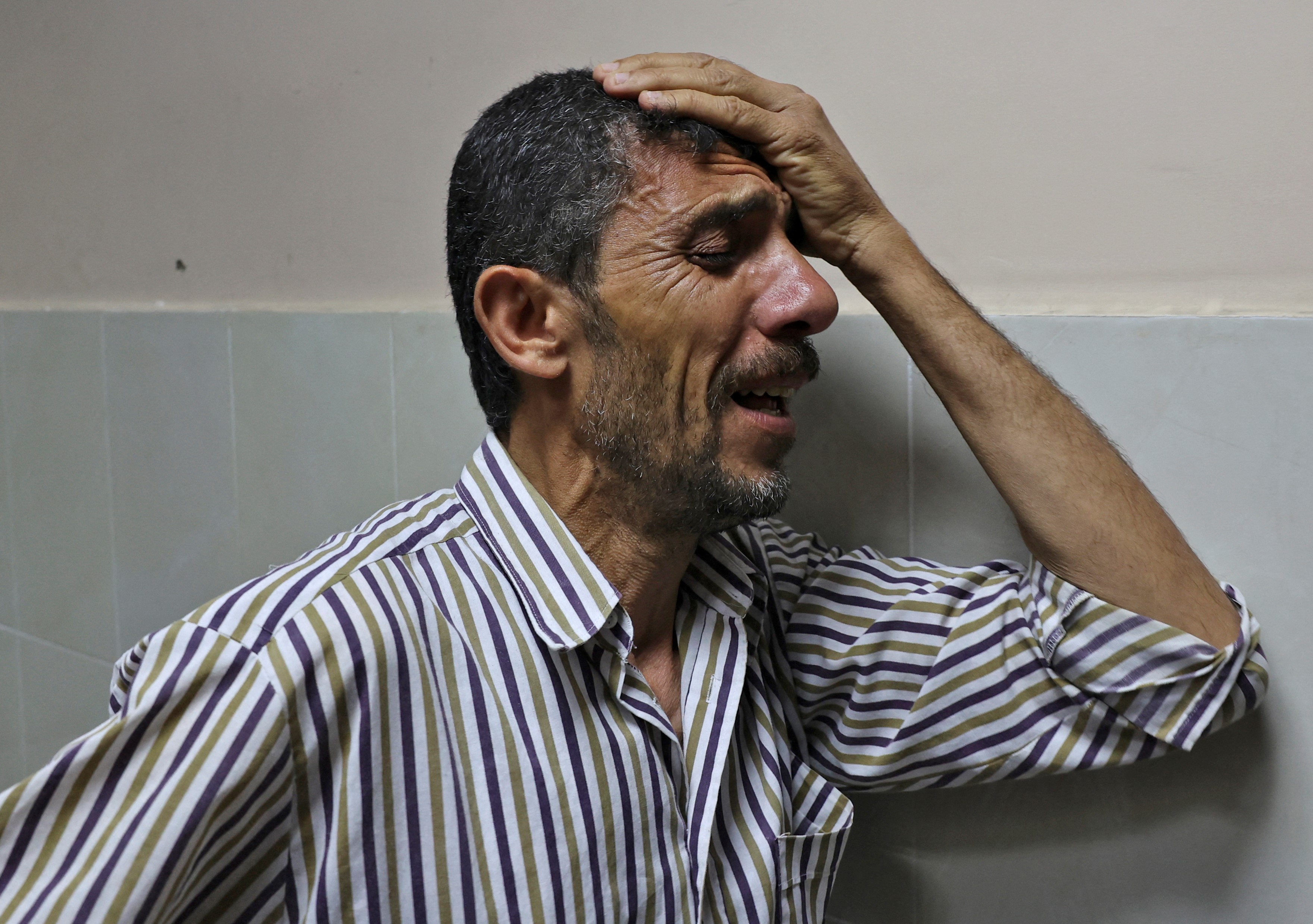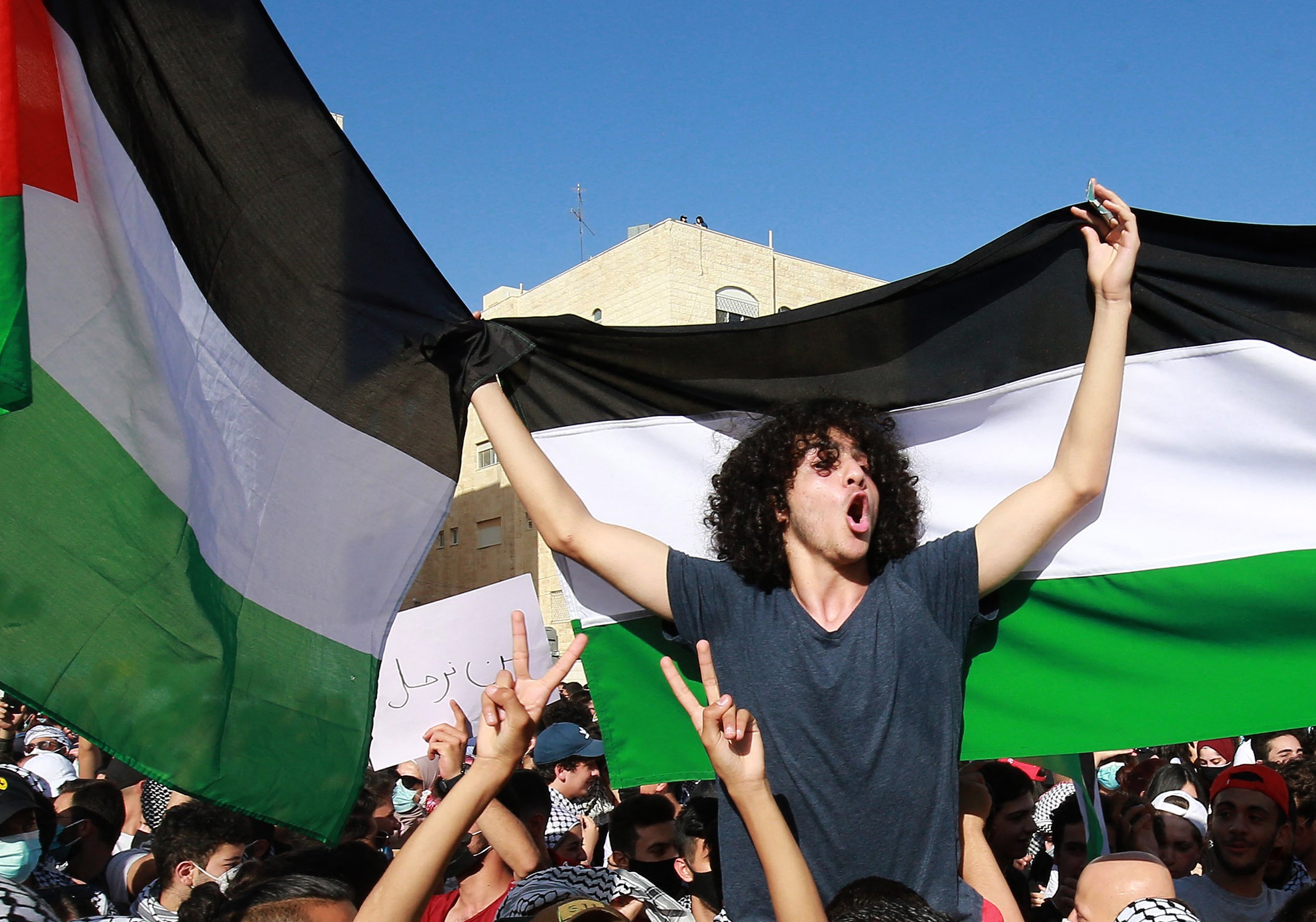Israel-Palestine: Nine days that shook the world

"I am getting lots of messages from my Israeli friends," a Palestinian citizen of Israel said over Signal. Presumably because she thought Shin Bet could not monitor the call. "They tell me not to worry. Things will soon be back to normal.
'For the first time in my life I see something that has been dormant for decades, stirring, coming alive'
- Palestinian citizen of Israel
"I think to myself: the normal for you is to go back to the beaches. The normal for us is to go back to our cages. What is normal like for a Palestinian in Gaza, the West Bank, and Jaffa? To smile as we serve you falafel and humus, to laugh as we sell you our vegetables or repair your cars cheaper than you would do at home, or to labour on your construction sites?
"We are scared at the bloodshed that could take place. But we are happy. For the first time in my life I see something that has been dormant for decades, stirring, coming alive.
"I see a new generation stepping up. They are younger than me. They take orders from no-one and they are rising. I am fucking happy not to consider myself an 'Israeli Arab'. I am Palestinian, and for the first time in my life I can see light at the end of our long tunnel."
Fuelling the resistance
Stay informed with MEE's newsletters
Sign up to get the latest alerts, insights and analysis, starting with Turkey Unpacked
The speaker has an Israeli passport, a good job, a flat - actually a house which was once appropriated from a Palestinian family in Jerusalem. She travels regularly to Europe. Her Hebrew is perfect, better than many Jewish immigrants. In fact, she is often mistaken for a Jew.
Hers is only one in a cacophony of voices, and I do not select it because it suits the way I think. But as each day passes, the sentiments she has expressed, and that of other Palestinians like her who do not say it out loud, will do more to determine the future of this conflict than any contorted statement by US President Joe Biden or his Secretary of State Antony Blinken.
In fact, every apartment block Israeli jets demolish in Gaza, every family evicted from their home, every house given by the courts to a Jewish settler, now becomes an act of war. It will not produce defeat or resignation. It will fuel the fire of resistance.
The Israeli Zionist left prefers to see the status quo upended by "extremists on both sides," putting Jewish settlers and Hamas in the same bracket. The status quo, if you follow the logic of the speaker quoted above, is extremist and only benefits one side in this extremely unequal struggle .
Nine days have changed the conflict in a way most people outside the mixed cities of Haifa, Lod, Ramle, Acre and occupied East Jerusalem have yet to realise.
The realities of the relationship between Israelis and Palestinians that nine days ago appeared set in concrete - all 25-foot high and stretching for over 400 miles - have tumbled down with a speed that no one (least of all the speaker quoted above) could have predicted.
Bear with me while I go through them.
United we stand, divided we fall
For decades, the strategy of Israel, under a left- or right-wing government, was divide and rule.
Palestinians lived separate lives in enclaves under different regimes, enjoying different privileges: Gaza as an enemy state under siege with just enough calories and electricity to survive; the occupied West Bank under the nominal rule of an unelected Palestinian leadership; Palestinians in Jerusalem who have residency permits; Palestinian citizens of Israel who have passports. The Palestinians in the diaspora do not appear to exist, according to Israel.
This struggle has been characterised by long periods of quiet and submission. Each time this happens, Israel mistakes quiet for acquiescence
Each had different issues. For Gaza, it was electricity, water, and concrete. For the West Bank, it was salaries and jobs. For Jerusalem it was houses; for Palestinian citizens of Israel, it was equality and policing. But each was dependent on Israel, to open and close gates in the wall, to have access to tax income, or medical care. The security apparatus of the Palestinian Authority (PA) was designed and trained as an extension of Israel's security.
This way, Palestinians were kept on a leash providing the cheapest ever occupation for Israel.
Separation became so dominant that, for years, it was internalised by the Palestinians. They had difficulty thinking that it could be otherwise. When fighting erupted between Israel and Gaza in 2009, 2012, 2014, Palestinians in the West Bank were, mostly, passive spectators. Cars were not burnt in Lod. There was no general strike. The residents of areas threatened with eviction like Sheikh Jarrah fought their own lonely, local battles for decades.
For nine days, unity has been coursing through Palestinian veins. It was caught live on Al Jazeera, which at one point a week ago carried a split screen of scenes at the Damascus Gate, where Palestinians were arriving to enter the old city, and at the Hebron Gate, where Jewish settlers were arriving with Israeli flags.
At first, I did not realise what I was seeing. A rocket from Gaza flew overhead. The settlers fled in panic. The Palestinians stayed where they were, waving and cheering. Palestinians in Jerusalem had called for Gaza to intervene and chanted for Mohammed ad-Deif, the head of al-Qassam Brigades, to come to their support.
The unpalatable truth
The Israeli security establishment said this was because the organisers of the al-Aqsa protest were members of Hamas.
The Palestinian leaders are past masters at shedding their political skins and slithering back to the opposite camp. But they are not the drivers of this movement. They are being driven by it
They gave the militant group too much credit. It was not just Hamas members chanting "Mohamed ad-Deif". It was a new generation of Palestinians in search of their Saladin. The unpalatable truth is that Hamas does not appear to have made a mistake by firing those missiles at Jerusalem when Israel refused to withdraw from the al-Aqsa complex.
By firing missiles not in defence of Gaza, but of al-Aqsa, Hamas pushed the conflict past a tipping point, triggering the revolt among the Palestinians of 1948 and the West Bank too. Had rockets not been fired, the situation could have returned to calm, after the end of Ramadan, and that is what the Israeli media were expecting. After Ramadan, Israeli authorities could have resumed their evictions of the Palestinian residents of Sheikh Jarrah in particular and Palestinian residents of Jerusalem in general.
As a consequence, the events that followed have created a broad Palestinian front, a phenomenon not seen since 1948.
A revolt of these dimensions has not come out of the blue. It has been decades in the making. It has come precisely at the time when the Israeli right boasted that the conflict was over. They said so openly in the US media and at the UN. On Monday, Fatah flags were seen to be flying alongside Hamas flags in protests in Nablus and it is a long time, too, since that was seen. Fatah has to be seen to be responding to the prevailing mood.
Similar unity was expressed at the start of the Second Intifada, but as soon as Yasser Arafat was dealt with, Fatah returned to security cooperation with its paymasters in Israel. It is telling that a general strike was first called by the leadership of the 1948 Palestinians, to be endorsed by Palestinians in the West Bank. This led to the biggest general strike since 1936.
There are grounds to be sceptical about this newfound unity. The Palestinian leaders are past masters at shedding their political skins and slithering back to the opposite camp. But they are not the drivers of this movement. They are being driven by it.
Palestinians and Arabs
The second major strategy to have been dented, if not undermined, in the last nine days was the sustained attempt to separate Palestinians from their Arab backers. This culminated in the Abraham Accords in Washington last year, but had started with Egypt's and Jordan's peace treaties with Israel.
Just a few short weeks ago, it looked as if Saudi Arabia would come on board, to be followed shortly afterwards by Oman and Qatar. Within a matter of months, the boycott of Israel by the major Gulf Cooperation Council powers would have been reversed, the Arab Peace Initiative (the last major offer to settle this conflict) would have been over, and the Palestinians would have effectively become a migrant workforce without a state, relegated to the status of the Kurds.
While this scenario has not disappeared, and while the Saudi and Emirati influencers and bots are still pumping out Israel's narrative, this strategy is being overwhelmed by mass demonstrations of protesters in Jordan trying to cross the border with Israel; incursions too, from southern Lebanon into Israel; and Egypt being forced to open its border at Rafah and take in wounded Palestinians in Gaza.
President Abdel Fattah el-Sisi is no fan of Hamas or the Muslim Brotherhood. He destroyed a whole city, the Egyptian side of Rafah, and forcibly removed its inhabitants so that tunnels running under the border could be flooded and destroyed.
If any Arab leader has enforced the siege of Gaza more zealously than the Israelis, it has been Sisi. And yet he has been forced now to open the border he spent so much energy in shutting. Of course, political messages are being sent. After the unpleasant shock of a Saudi-sponsored attempt at a palace coup, Jordan's King Abdullah is no doubt using the turmoil to remind Netanyahu that Israel has its longest and most vulnerable border with Jordan.
Little happens in the kingdom without the permission of the Jordanian mukhabarat, and particularly not in the sensitive border area, so the pictures of crowds of Jordanians marching on the Israeli border would not have happened without state license. It is telling how eastern Jordanians were in the forefront of this protest. This is another sign that the divisions, which kept the status quo in place, are dissolving.
The exact identity of the group responsible for launching missiles from southern Lebanon at Israel has yet to be determined and verified. So far, it suits Hezbollah to license missile launches rather than launch its own much deadlier rocket arsenal at Israel.
Palestinian diaspora
The third plank of the status quo was to isolate Palestinians worldwide. A whole ministry, the Ministry of Strategic Affairs, was created by Israel to combat the Boycott, Divestment and Sanctions movement, delegitimisation, and deal with western politicians who would not play ball with their narrative.
Irrespective of the now ritual statements of support from the political elite, the feeling of popular outrage over and support for Gaza is overwhelming
The ministry succeeded in its tactical battle to conflate opposition to Zionism, and opposition to Israel, with antisemitism. It succeeded in bullying and terrifying a generation of politicians on both sides of the Atlantic, making the former Labour leader Jeremy Corbyn an object lesson of what happens to a politician when he refuses to play ball.
But these were tactical victories, not strategic ones. Irrespective of the now ritual statements of support from the political elite, the feeling of popular outrage over and support for Gaza is overwhelming. Large demonstrations took place in London, New York, Berlin and Paris.
Israel has lost a battle that is being played out on unfamiliar territory: TikTok and Instagram. The Israeli Defense Forces' social media accounts are a joke.
When Paris Hilton retweeted Middle East Eye's interview with a 10-year-old girl in Gaza expressing in fluent English her incomprehension at the bombing: "I am just ten. Why do we deserve this?," her anguished plea of pain went around the world several times.
The Israeli army is a past master at manipulating the truth. It hoodwinks the mainstream western media into believing a ground incursion into Gaza had started (to flush out Hamas fighters entering their tunnels). Its air force may bomb the building housing AP and Al Jazeera.
But the conflict of the last nine days was not played out in the mainstream media, which was slow to start and reluctant to report it all the way along. It was fought on social media, and Israel can not prevent videos of anguished Gazan children from spreading like wildfire over social media. Furthermore, Palestinians can now express themselves in good English.
Hilton deleted her tweet. Bella Hadid did not delete hers. Irrespective of the pressure on A-listers to conform to the status quo, the damage has been done.
A new dawn
It will be for history to judge whether the events we are witnessing turn into a full intifada, or an al-Quds or Jerusalem intifada. The debate now among Palestinians is how a third intifada could continue after the ceasefire which will inevitably happen in the next few days.
But let's say an exhausted quiet descends on the region after a ceasefire is negotiated between Israel and Hamas. Will everything go back to normal?
I doubt it. The contours of the new struggle have already been determined. It has Jerusalem at its geographical centre, and Palestinian citizens of Israel as its foot soldiers.
They will be backed by a generation with nothing to lose. They have no leaders, no state, no Arab countries backing them, no rights, no arms, and no hope of getting any of them. Having deprived them of their own state, and declared in the Nation-State Law that the state of Israel is the expression of self-determination for its Jewish citizens only, a revolt can not come as a surprise.
The power-drunk lords of the land have left this generation of Palestinians with few viable alternatives. This struggle has been characterised by long periods of quiet and submission. Each time this happens, Israel mistakes quiet for acquiescence. It deludes itself into thinking the conflict is over.
But each time a new leadership emerges from the bottom up. This is how Yasser Arafat came to the fore. This is happening again and the world should wake up to it.
The views expressed in this article belong to the author and do not necessarily reflect the editorial policy of Middle East Eye.
Middle East Eye delivers independent and unrivalled coverage and analysis of the Middle East, North Africa and beyond. To learn more about republishing this content and the associated fees, please fill out this form. More about MEE can be found here.










